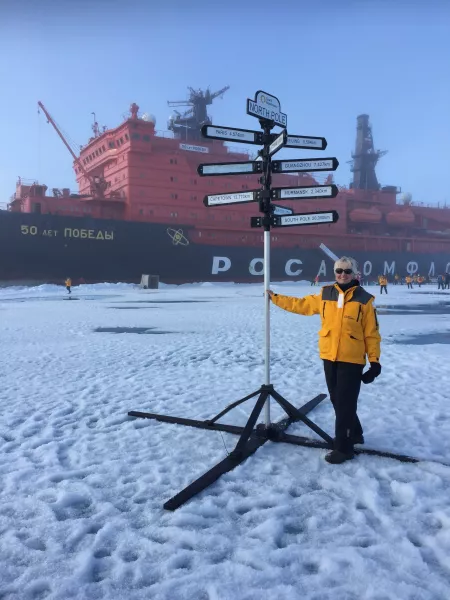Fran Ulmer is a Senior Fellow with the Belfer Center’s Arctic Initiative. She also is Chair of the U.S. Arctic Research Commission and Global Board Chair of The Nature Conservancy. She has served in Alaska as Mayor of Juneau, State Representative, and Lieutenant Governor – the first woman elected to statewide office in the state. She also was Chancellor of the University of Alaska.

Imagine taking everyone who lives in Boston and spreading them out over an area so big its boundaries would stretch from Florida to Minnesota and Arizona. That gives a rough idea of the breathtaking scale that defines Fran Ulmer’s adopted home state of Alaska.
Ulmer, a Senior Fellow with the Belfer Center’s Arctic Initiative, served for 18 years as an elected official in Alaska, culminating as Lt. Governor. In that role, and in her more recent service as chair of the U.S. Arctic Research Commission and chair of the Nature Conservancy Board, Ulmer has seen up close the challenges of driving economic growth while also addressing the dangers of climate change in a state where one-third of the economy derives from oil production.
Alaskans are literally on the front lines of disruptive climate volatility. “We see and feel the rapid changes in dramatic ways, from retreating glaciers to forest fires,” Ulmer says. “Some communities are moving because of flooding, coastal erosion, and thawing permafrost.”
It’s easy to point fingers at a fossil-fuel rich state like Alaska, but Ulmer sees the need for shared responsibility—and shared solutions. “Until people stop driving cars with gasoline or heating their homes with fossil fuels, there will be a need for the oil produced by Alaska or someplace else,” she says.
At the same time, she’s adamant about the need for every stakeholder to step up. “There are many things that can be done by individuals, companies, governments—all of us—to reduce our fossil fuel use and slow the rate of warming,” she says. “Books like Drawdown give people good ideas about how they can help with both direct action and by using their voice and their vote to change the direction of policies.”
After her service as Lt. Governor ended, Ulmer spent a year at Harvard as an Institute of Politics Fellow. That experience underscored for her the critical need to train future generations to leverage good politics and effective policymaking to safeguard the planet. “It’s not enough to do good science,” she explains. “You have to connect science to policy and politics.”
Ulmer recently helped lead an Arctic Initiative trek to Iceland, where students proposed policies for safeguarding the Arctic. These engagements have left her hopeful about humanity’s prospects for meeting an existential threat. “The smart young people I meet are amazing,” she says. “They’re so positive about the future. They don’t think ‘We can’t get it done.’ They think ‘We’ll figure it out’.”
Many outsiders think of Alaska as frozen tundra shrouded in constant darkness. But temperate climes and long summer days make the state a paradise for outdoor adventurers. Ulmer, who is a serious angler, reminded a recent staff gathering that half of all seafood harvested in the United States comes through Dutch Harbor, Alaska.
Ulmer’s favorite spot in a state with seemingly endless vistas is a small cabin on an island in southeast Alaska. “When you close your eyes and think of a place that gives you joy, I mentally fly myself to this beautiful little piece of land where I can see eagles flying above my head, see whales spouting, and catch a halibut in a small boat. That’s my favorite place.”
Burek, Joshua. “Spotlight: Fran Ulmer.” Belfer Center for Science and International Affairs, Harvard Kennedy School, Fall/Winter 2019-2020
